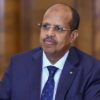JUBA, Jan 7 – Hundreds of dancing south Sudanese took to the streets of their capital on Friday to celebrate what they called the "final march to freedom," ahead of an independence referendum beginning this weekend.
A marching band led the parade, wearing T-shirts showing a pair of chained hands snapping their bondage, and emblazoned with the slogan: "We are going."
Behind came schoolchildren dancing on the roof of a truck, giant speakers blaring the tune, "Yes to separation, no to unity."
Demonstrators were clear about their desire for separation of the south, to be decided in a week-long referendum that begins on Sunday.
"Today we want to mark the last day for the rally, the last mobilisation for our people to ensure they will come out and vote," said Jacob Kenyi, an organiser of the march.
"The day after tomorrow, we vote for separation."
Cheers rang out when the parade passed a giant countdown sign, which marked the one full day left before the vote.
Many schoolchildren and students joined the parade, too young to vote but wanting to take part in some way.
As a result of the devastating 1983-2005 civil war which left around two million people dead, 51 percent of the south\’s population is below the age of 18, according to official estimates.
"We are the generation of the future, so even if I won\’t vote, I want to be involved," said Florence Waya, a 16-year old schoolgirl. "The referendum means so much to me, because I will get independence."
Many waved southern flags, some fluttering from the back of motorbikes and cars honking their horns, as the procession wound through town and traditional dancers banged out a marching rhythm on a giant drum.
"New nation South Sudan," read one sign. "Vote for secession to guarantee your children\’s freedom," read another, tied to the back of a minibus crammed full of supporters.
One car had fixed a giant cut-out of a waving, open hand — the symbol for independence on ballot papers for the south, where illiteracy runs as high as 80 percent, according to figures by aid agency Oxfam.
The crowd marched through Juba before heading towards the grave of late rebel leader John Garang, who led the mostly Christian south to a 2005 peace deal with the Muslim north that ended Africa\’s longest-running civil war.
Meanwhile, former South African president Thabo Mbeki that the referendum marks the "true emancipation" of the people of the south.
"The work of freedom is just at its beginning," he said, speaking at a public lecture to a crowded hall in Juba.
"We are confident that the southern Sudanese people have the strength and spirit to succeed in that endeavour."
Mbeki heads an African Union team mediating talks on Sudan\’s outstanding post-referendum issues between north and south, including oil sharing.
South Sudan is still recovering from the decades-long war with the north, which was fuelled by religion, ethnicity, ideology and resources, particularly oil.
The referendum is the key provision of the Comprehensive Peace Agreement (CPA) signed between Khartoum and the southern rebels in 2005.
Most analysts expect the referendum will partition Africa\’s largest nation in two.
Southerners have been holding marches every month since July to mark the countdown to the referendum and show their determination that the vote should take place as promised under the peace deal.
"The end is now in sight," said Alex Achak. "Ever since the CPA agreement set up the referendum, we have been waiting for this day and hoping we would reach here in peace."
Meanwhile, George Maker Benjamin, spokesman for the South Sudan Referendum Commission, said an official ban on further campaigning would come into force after Friday\’s rallies.














































